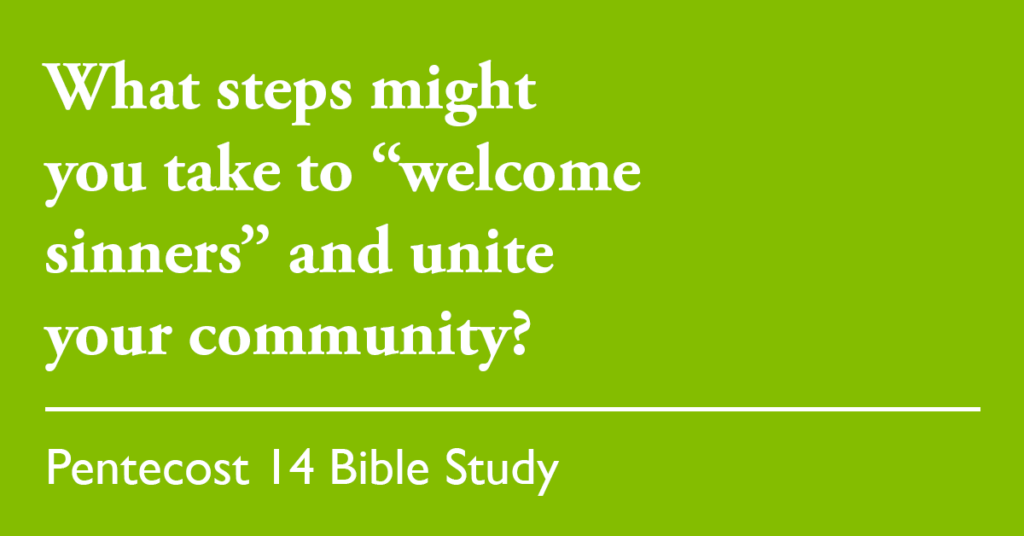This page is available in: Español
Bible Study: Proper 19 (C) – 2022
September 11, 2022
[RCL] Jeremiah 4:11-12, 22-28; Psalm 14; 1 Timothy 1:12-17; Luke 15:1-10

Jeremiah 4:11-12, 22-28
There is no way to read this passage from Jeremiah and not compare it in some way to all the news that we hear each day from around the globe. It does indeed seem that there is a hot wind blowing fiercely at us, the foolish people, the stupid children. From record-breaking heat, fire, and floods right in our backyards to Saharan dust clouds high in the atmosphere, it is not hard to imagine that our fruitful land will be a desert and that the cities will be laid in ruins. Yet verse 27 of Jeremiah’s lament reminds us that the Lord is not going to end it here; there is something on the other side of this desolation.
Jeremiah’s prophecy is not exactly hopeful, but it also does not allow us to simply give up and pack it in. Things are going to be bad, “the earth shall mourn,” but we remain God’s people, we have no choice but to remain steadfast in our faith as we move through what might be our own dark night of the soul.
- Do you think that God has given up on us, or is there a chance for redemption?
- What in this passage might give you insight into a way through these dark days?
Psalm 14
Psalm 14 maintains the same theme that was articulated in the reading from Jeremiah. In fact, it provides some more details that can help us see exactly how we ended up in this dismal state. We are the fools who have lost our faith and have committed “abominable acts,” and there is not a single one of us who has proved faithful.
What the psalm also provides is a glimmer of hope about the restoration of Israel. It certainly won’t be by our own doing, however, but by the Grace of God.
- Do you feel singled out as the fool in this psalm, or are you tempted to think that it applies to other people in another time?
- Do you find hope in verse 7? How might we show that our faith has been restored?
1 Timothy 1:12-17
This reading doesn’t let us off the hook in terms of our sinfulness, but it provides a valuable opportunity for us to make essential connections between our own sinfulness, that of Paul, and the sinfulness of all who have gone before us. We need to draw on that Scripture to see and understand how Christ has worked and will continue to work in our lives.
- What do you think is the one thing necessary to receive God’s mercy? How might you build your life around that?
- In what ways does this passage connect to the Old Testament readings we just studied?
Luke 15:1-10
It is never comfortable to see oneself as a Pharisee or a scribe; they are the “bad guys” after all, but that is precisely what we must do if we are to glean all that we can from this passage. We need to see ourselves as those types of hypocrites and sinners to understand that Jesus is not worried so much about the lost sheep as he is about the unity and solidarity of the community. We all need to repent, for we all are sinners, and the sooner we come to terms with that, the better.
This reminds me of the story that is often told at summer camp about “going on a bear hunt” where we come across all kinds of obstacles while going on our bear hunt, and at each one, the refrain is “can’t go over it, can’t go under it, can’t go around it, have to go through it.” The sooner we accept our sinful natures and repent, the sooner there will be “joy in the presence of the angels of God.”
We must also remember that our acts of repentance must include mercy and forgiveness to those who may have acted against us.
- Where do you see yourself in this reading?
- What steps might you take to “welcome sinners” and unite your community?
- How can your attitude of forgiveness and mercy fit into this context?
This page is available in: Español
Don’t forget to subscribe to the Sermons That Work podcast to hear this sermon and more on your favorite podcasting app! Recordings are released the Thursday before each liturgical date.
Receive Free Weekly Sermons That Work Resources!
This page is available in: Español


